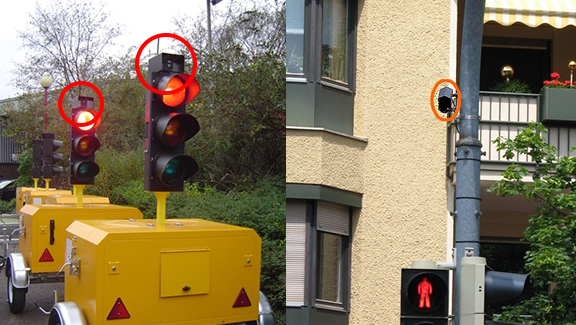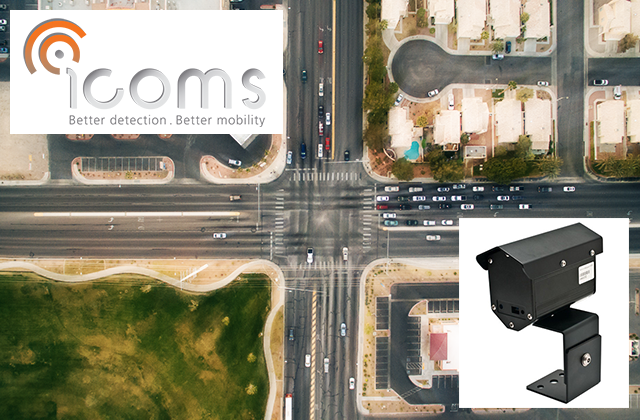IRD is a leading provider of advanced traffic management and intelligent transportation solutions and is renowned internationally in the field of sensing and transportation intelligence. With the recent acquisition of iCOMS Detection, IRD is extending its reach to traffic management using non-intrusive technologies. This fits perfectly within IRD’s strategic growth plan to encompass new areas and extend our current offerings.
iCOMS is a Belgian company that specializes in the design and manufacture of detectors and non-intrusive equipment for vehicle counting, classification and speed measurement. For 25 years, iCOMS has developed a range of sensors based on microwave technologies. iCOMS products today include radar detectors for vehicles and bicycles, pedestrian sensors, speed measurement sensors, intersection control sensors and traffic data collection sensors. Intelligent transportation system applications include speed warning signs for improved traffic safety and the delivery of quality data to support revenue audit of electronic toll collection. At IRD we believe that great data is a prerequisite for a smart city and that cost-effective sensing and intelligence solutions are vital.

The Power of Sensing in a Smart City
The ability to sense fluctuations in traffic flow and react accordingly, is a critical component of a smart city. A complete smart city transportation system should be able to sense threats and opportunities, be adaptable to changes in the environment, have clarity of purpose, and have major modules that connect readily. In addition, transportation planners and operators should be able to assess the status of the system at any given time.
Sensing technologies play a critical role in being able to achieve these essentials. The process of collecting data, converting it to information, gleaning insight from the information and developing actionable strategies, begins with the bedrock of sensing technologies. The full value of transportation management applications can only be realized when the complete process is supported and new strategies for managing transportation are revealed and implemented.
Of course, it is necessary to develop the necessary intelligence to act based on the data being collected and the new insights gained. It is also our ambition to help our clients unlock the power of “results driven intelligence” and to align their organizations to unlock the full value of data and insight. This is clearly demonstrated in our VI²M™; solution for web-based traffic data collection and analysis. We expect to extend and enhance our back-office intelligence systems for transportation in the future delivering data and reports to customers derived from integrated solutions.
As a company, we are committed to a sensible growth strategy that may involve the acquisition of new clients, the delivery of new services, and adding capability to existing services. Our recent acquisition of iCOMS includes all of these approaches.
Expanding Our Capability to Intersection Management
Radar-based sensors have the flexibility to address many applications within a smart city including support for connected and autonomous vehicles. Recognizing the value and flexibility of the sensor technology, iCOMS will continue to operate as IRD’s center of excellence for research and development of next generation radar products. Radar products are particularly valuable within the context of intersection data collection and traffic management. Our existing products and services focus on the road link between intersections, so a natural extension of our offering is to address the intersection. Intersections provide both a challenge and an opportunity. The challenge lies in managing the potential conflict between opposing traffic flows. The opportunity lies in making use of intersection control equipment as a roadside point of presence. The management and control of intersections on a systemwide basis also presents the opportunity to manage transportation as a single network of interconnected elements. The new capabilities that ICOMS brings to our organization will help us to do this.
Traffic detection is an integral part of advanced traffic signal control. To ensure that traffic signals are adaptive and coordinated, detection is required. Adaptability lies in the ability to sense changes in traffic flows and adjust the traffic signal timings at each intersection accordingly. Coordination lies in managing the intersections as a network taking account of the individual conditions at each intersection and the need to harmonize timings across the entire network for traffic optimization. Optimizing traffic flow is a key element of transportation service quality and improves quality-of-life for smart city residents and visitors.

Why Radar at Intersections?
Radar detection for intersections has the advantage of being non-intrusive. Radar units can be mounted on poles above the highway and there is no need to cut into the pavement surface. This provides flexibility so that if lanes are re-striped, the radar units can simply be reconfigured with no need to cut additional slots in the highway.
Radar also offers a lower lifecycle cost than inductive loops as there is no wear-and-tear associated with the technology, unlike inductive loops that are continually subject to the same conditions that cause pavement wear or damage. This feature also makes radar units impervious to repair or installation of utilities under the road that require excavation. Greater reliability means that radar sensors have a longer life cycle than inductive loops. If one considers a quality index as a combination of accuracy and availability, then radar would score much higher than inductive loops.
Future-proof Applications
Automakers are are increasingly incorporating Advanced Driver Assistance Systems (ADAS) into vehicle electronics to enhance automotive safety. Much of the development today focuses on technology in the vehicles, but the next generation of ADAS will increasingly communicate with infrastructure. Radar sensors will continue to have a role to play in providing data to these networked vehicles.
Road pricing and toll roads are another growth area as road infrastructure is increasingly funded through mechanisms other than gas taxes. Many of the new systems use “open road tolling” that does not require vehicles to stop to pay tolls. Radar detectors will play a significant part in collecting data for auditing of toll revenues.
ICOMS’ advanced doppler radar technology can also be used for speed measurement, vehicle classification and vehicle counting in addition to traffic signal detection. This makes it ideal to form an integral part in the data collection activities for a smart city. Quality information is a pre-requisite for great decision-making and enables the level of transportation service needed for smart cities.
IRD detection technologies provide the level of quality and availability that can form the ideal basis for smart city decision-making. All you have to do to improve the quality of your decision-making is to make one decision – contact us, and let us explain how we can deliver high-quality data and help you to turn it into smart city intelligence. Isn’t it time to stop burying a non-renewable resource in the ground, like a hidden treasure?
Learn more about our new products: iCOMS Non-Intrusive Detection Systems



